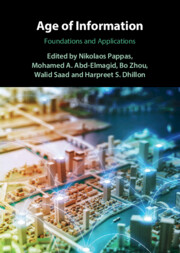Book contents
- Frontmatter
- Contents
- Contributors
- Acknowledgments
- 1 The Probability Distribution of the Age of Information
- 2 On the Distribution of AoI
- 3 Multisource Queueing Models
- 4 Controlling the Age of Information: Buffer Size, Deadlines, and Packet Management
- 5 Timely Status Updating via Packet Management in Multisource Systems
- 6 Age of Information in Source Coding
- 7 Sampling and Scheduling for Minimizing Age of Information of Multiple Sources
- 8 Age-Efficient Scheduling in Communication Networks
- 9 Age-Driven Transmission Scheduling in Wireless Networks
- 10 Age of Information and Remote Estimation
- 11 Relation between Value and Age of Information in Feedback Control
- 12 Age of Information in Practice
- 13 Reinforcement Learning for Minimizing Age of Information over Wireless Links
- 14 Information Freshness in Large-Scale Wireless Networks: A Stochastic Geometry Approach
- 15 The Age of Channel State Information
- 16 Transmission Preemption for Information Freshness Optimization
- 17 Economics of Fresh Data Trading
- 18 UAV-Assisted Status Updates
- Index
7 - Sampling and Scheduling for Minimizing Age of Information of Multiple Sources
Published online by Cambridge University Press: 02 February 2023
- Frontmatter
- Contents
- Contributors
- Acknowledgments
- 1 The Probability Distribution of the Age of Information
- 2 On the Distribution of AoI
- 3 Multisource Queueing Models
- 4 Controlling the Age of Information: Buffer Size, Deadlines, and Packet Management
- 5 Timely Status Updating via Packet Management in Multisource Systems
- 6 Age of Information in Source Coding
- 7 Sampling and Scheduling for Minimizing Age of Information of Multiple Sources
- 8 Age-Efficient Scheduling in Communication Networks
- 9 Age-Driven Transmission Scheduling in Wireless Networks
- 10 Age of Information and Remote Estimation
- 11 Relation between Value and Age of Information in Feedback Control
- 12 Age of Information in Practice
- 13 Reinforcement Learning for Minimizing Age of Information over Wireless Links
- 14 Information Freshness in Large-Scale Wireless Networks: A Stochastic Geometry Approach
- 15 The Age of Channel State Information
- 16 Transmission Preemption for Information Freshness Optimization
- 17 Economics of Fresh Data Trading
- 18 UAV-Assisted Status Updates
- Index
Summary
In this chapter, we consider a joint sampling and scheduling problem for optimizing data freshness in multisource systems. Data freshness is measured by a nondecreasing penalty function of Age of Information, where all sources have the same age-penalty function. Sources take turns to generate update samples, and forward them to their destinations one-by-one through a shared channel with random delay. There is a scheduler, that chooses the update order of the sources, and a sampler, that determines when a source should generate a new sample in its turn. We aim to find the optimal scheduler–sampler pairs that minimize the total-average age-penalty (Ta-AP). We start the chapter by providing a brief explanation of the sampling problem in the light of single–source networks, as well as some useful insights and applications on age of information and its penalty functions. Then, we move on to the multisource networks, where the problem becomes more challenging. We provide a detailed explanation of the model and the solution in this case. Finally, we conclude this chapter by providing an open question in this area and its inherent challenges.
- Type
- Chapter
- Information
- Age of InformationFoundations and Applications, pp. 166 - 198Publisher: Cambridge University PressPrint publication year: 2023



